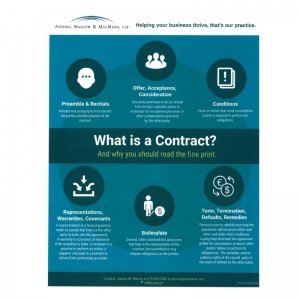What is a contract: Part 2: Offer, Acceptance, Consideration: What’s in it for you?
This post continues my series explaining the main elements of a contract, which are outlined on the attached infographic. My goal is to demystify some of these basic provisions to help business owners have a better general understanding of what they are signing.
Moving through the structure of a typical contract, next up is offer, acceptance, and consideration. Together, these clauses define what the offering party is promising to do (or refrain from doing) in exchange for the compensation the other party is willing to pay or provide. They basically comprise the tit for tat, or the meat of the obligations and privileges which are being offered. This is often referred to as a “meeting of the minds.” While this might seem obvious on its face, the devil may be in these details, so it is vital that you know and understand the specific nature of your obligations and be sure that they are sustainable, practical, and likely to result in a benefit to your bottom line or some other benefit to your business. So what can happen when parties fail to clearly memorialize their “meeting of the minds”? Here are a few scenarios that could result:
• The parties might become embroiled in a “battle of the forms”, particularly in the sale of goods context where a buyer submits a purchase order using their company’s form, and the seller responds using their own terms and conditions form containing different and/or additional terms.
• Parties can ask the court to apply certain legal theories to supplement the “four corners of the document” where the intent of the parties may not be clear from the contract itself. For example, even if there is no formal consideration, courts can apply the theory of promissory estoppel to enforce a party’s promise to do something if the other party relied on that promise to his or her detriment.
• Another equitable remedy allows the court to compel a party to make restitution if that party is enriched at the expense of the other party and the surrounding circumstances lead the court to conclude that it is unjust.
• Pennsylvania has a little-known statute called the Uniform Written Obligations Act, which allows the court to infer that consideration exists where the agreement includes language that clearly and expressly states that the parties intended to be legally bound by the agreement.
Stay tuned for Part 3 of this series, which will move to the next element on the infographic: Conditions.
Visit ammlaw.com to learn more about our contract review services, or Joanne Murray.





















